Paradise Lost 失乐园赏析
失落的天堂:《失乐园》的浪漫主义解读

失落的天堂:《失乐园》的浪漫主义解读一、引言:1. 背景介绍《失乐园》是英国文学家约翰·弥尔顿于1667年出版的史诗作品,被视为英国文学史上最伟大的作品之一。
本文将从浪漫主义的角度解读该作品。
2. 浪漫主义简介浪漫主义是18世纪末至19世纪初期兴起的艺术和文学运动,追求自由、个性和情感表达。
该运动强调个体自我意识和情感体验,渴望摆脱现实世界的束缚。
二、《失乐园》中的浪漫主义元素:1. 自由与反叛作品中描绘了亚当和夏娃对上帝禁令反抗的故事。
他们选择违背上帝意愿以追求知识和自由,展现了强烈个性、独立思考和对权威蔑视等浪漫主义特质。
2. 自然与荒野《失乐园》中通过描绘伊甸园美景和亚当、夏娃的自然生活,传达了对自然的热爱与崇拜。
自然成为浪漫主义者寻求精神安慰和灵感的场所。
3. 英雄主义与超越弥尔顿通过描绘萨坦的反抗和亚当、夏娃的悔过,展现了人类永不放弃追求理想与真理的英雄精神。
这种超越自我的力量与浪漫主义思想息息相关。
4. 错误与复仇作品中,亚当与夏娃犯下了错误,失去了伊甸园的快乐。
他们尝试通过对自己过去错误行为的反省来实现复仇并恢复失落的天堂。
这种个人命运的转变符合浪漫主义关注个体内心世界以及个体在历史进程中所遭遇困境。
三、《失乐园》对后世文学艺术影响:《失乐园》作为一部具有浓厚浪漫主义色彩的作品,对后世文学艺术有着深远影响。
- 影响了希腊神话题材的创作,如《神曲》等。
- 对浪漫主义运动产生重要影响,激励了许多浪漫主义诗人、小说家以及艺术家。
- 启发了一系列关于自由意志和道德选择的哲学思考。
四、结论:通过对《失乐园》的浪漫主义解读,我们可以看出该作品对个体自由与反叛、自然与荒野、英雄主义与超越以及错误与复仇等浪漫主义元素的深入描绘。
它不仅影响了后世文学和艺术创作,也为人类对于自由意志和道德选择等大问题提供了思考的源泉。
《失乐园》在文学史上堪称一部具有深远意义的经典之作。
(字数:294 个中文字)。
paradise lost读后感

paradise lost读后感
《失乐园》是约翰·弥尔顿的一部史诗,描述了亚当和夏娃在伊甸园中的生活,以及他们违背上帝的禁令而遭受的惩罚。
本书不仅包含了宗教和哲学的思考,还有强烈的叙事性和诗歌感。
本人在读完《失乐园》后,深受其所感动。
这部作品展示了人类的历史和人性的多面性,其中包括安逸、欲望、罪恶和羞耻等情感。
这些情感都是人类生活中必须面对的,这让我感到非常深刻。
本书中的角色和场景都极为鲜活,如亚当和夏娃在伊甸园中的日常生活、撒旦引诱夏娃等等,这些情节都让人感到非常震撼。
此外,该作品对于对抗邪恶的探讨也非常深刻,值得每位读者深思。
总的来说,《失乐园》是一部充满思考和内涵的作品,它让我更深刻地了解了人类的历史和人性。
它既是一部文学作品,也是一部哲学和宗教作品,它的作用非常深远,值得每位读者去认真阅读和思考。
- 1 -。
失乐园探讨了人性的善恶
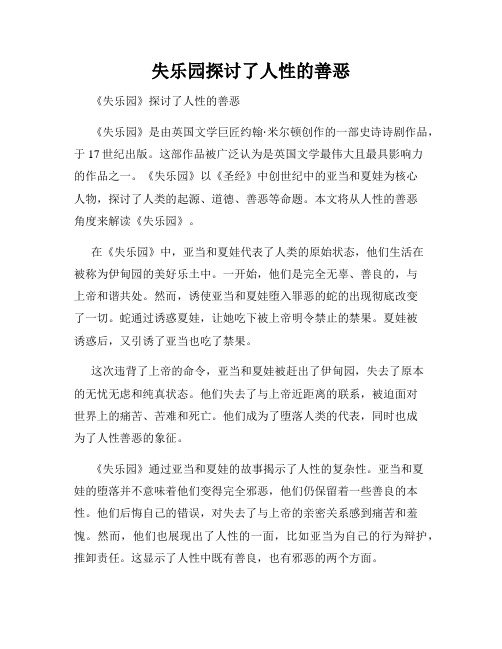
失乐园探讨了人性的善恶《失乐园》探讨了人性的善恶《失乐园》是由英国文学巨匠约翰·米尔顿创作的一部史诗诗剧作品,于17世纪出版。
这部作品被广泛认为是英国文学最伟大且最具影响力的作品之一。
《失乐园》以《圣经》中创世纪中的亚当和夏娃为核心人物,探讨了人类的起源、道德、善恶等命题。
本文将从人性的善恶角度来解读《失乐园》。
在《失乐园》中,亚当和夏娃代表了人类的原始状态,他们生活在被称为伊甸园的美好乐土中。
一开始,他们是完全无辜、善良的,与上帝和谐共处。
然而,诱使亚当和夏娃堕入罪恶的蛇的出现彻底改变了一切。
蛇通过诱惑夏娃,让她吃下被上帝明令禁止的禁果。
夏娃被诱惑后,又引诱了亚当也吃了禁果。
这次违背了上帝的命令,亚当和夏娃被赶出了伊甸园,失去了原本的无忧无虑和纯真状态。
他们失去了与上帝近距离的联系,被迫面对世界上的痛苦、苦难和死亡。
他们成为了堕落人类的代表,同时也成为了人性善恶的象征。
《失乐园》通过亚当和夏娃的故事揭示了人性的复杂性。
亚当和夏娃的堕落并不意味着他们变得完全邪恶,他们仍保留着一些善良的本性。
他们后悔自己的错误,对失去了与上帝的亲密关系感到痛苦和羞愧。
然而,他们也展现出了人性的一面,比如亚当为自己的行为辩护,推卸责任。
这显示了人性中既有善良,也有邪恶的两个方面。
此外,在《失乐园》中,米尔顿通过其他角色的形象和对话,进一步探讨了人性的善恶。
撒旦是故事中的邪恶之源,他本身是一个堕落的天使,他的目标是引诱人类追随他的邪恶脚步。
然而,在塑造撒旦的形象时,米尔顿并没有将他完全描述为纯粹的邪恶之神,而是赋予了他复杂的思想和情感。
这种塑造显现了人性的灰色地带,让读者思考和质疑善恶的定义和界限。
此外,《失乐园》中还出现了一些善良的人物形象,如上帝的天使,他们忠诚于上帝,代表了善良和公正的一面。
他们与撒旦战斗,在面对邪恶时保持坚定不移,为善良的力量提供了一种反面到善行的观照。
他们的形象凸显了米尔顿对善恶之间持续斗争的思考。
paradise lost修辞手法
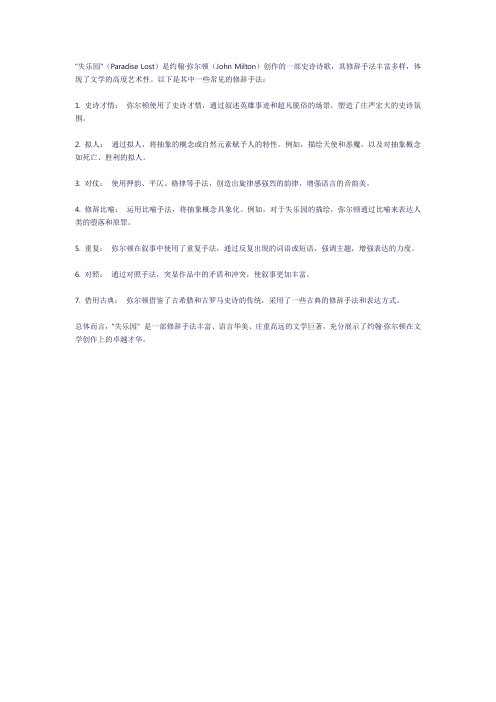
"失乐园"(Paradise Lost)是约翰·弥尔顿(John Milton)创作的一部史诗诗歌,其修辞手法丰富多样,体现了文学的高度艺术性。
以下是其中一些常见的修辞手法:
1. 史诗才情:弥尔顿使用了史诗才情,通过叙述英雄事迹和超凡脱俗的场景,塑造了庄严宏大的史诗氛围。
2. 拟人:通过拟人,将抽象的概念或自然元素赋予人的特性。
例如,描绘天使和恶魔,以及对抽象概念如死亡、胜利的拟人。
3. 对仗:使用押韵、平仄、格律等手法,创造出旋律感强烈的韵律,增强语言的音韵美。
4. 修辞比喻:运用比喻手法,将抽象概念具象化。
例如,对于失乐园的描绘,弥尔顿通过比喻来表达人类的堕落和原罪。
5. 重复:弥尔顿在叙事中使用了重复手法,通过反复出现的词语或短语,强调主题,增强表达的力度。
6. 对照:通过对照手法,突显作品中的矛盾和冲突,使叙事更加丰富。
7. 借用古典:弥尔顿借鉴了古希腊和古罗马史诗的传统,采用了一些古典的修辞手法和表达方式。
总体而言,"失乐园" 是一部修辞手法丰富、语言华美、庄重高远的文学巨著,充分展示了约翰·弥尔顿在文学创作上的卓越才华。
失乐园的语言特点

失乐园的语言特点
《失乐园》是英国诗人约翰·密尔顿于1667年创作的一部史诗诗剧。
这部作品以神话人物撒旦为主角,讲述了他诱使亚当和夏娃犯罪堕落的故事。
《失乐园》是一部具有很高文学价值的伟大作品,它的语言特点如下:
二、句法复杂:密尔顿的句子构造复杂,长句和短句交错使用,而且
往往由多个从句组成。
例如:“So spake th'apostate Angel, though
in pain,
Vaunting aloud but racked with deep despair;
三、运用修辞手法:密尔顿善于运用修辞手法来增强作品的表现力。
他运用了大量的比喻、隐喻和象征等修辞手法。
例如,密尔顿将天使撒旦
比喻为“apostate Angel”,暗指他的叛逆和背叛;将伊甸园描绘成“Paradise Lost”,暗示了失去乐园的悲剧性。
六、韵律感强:《失乐园》的语言具有很强的韵律感。
密尔顿善于运
用韵律、押韵和音乐感来创造出宏伟的史诗氛围。
整部作品中的诗句都遵
循一定的韵律规则,同时也注重和谐的音节组合,使得整个作品读起来具
有很好的声韵感。
总之,《失乐园》以其丰富的辞藻、复杂的句法、修辞手法、深刻的
哲理和强调人类自由意志的观点,成为英国文学史上的经典之作。
它的语
言特点使得作品更加生动、美感和思想深度,不仅给人以审美享受,也引
起了人们对于人性、道德和宗教等问题的思考。
Paradise Lost 失乐园逐句解析
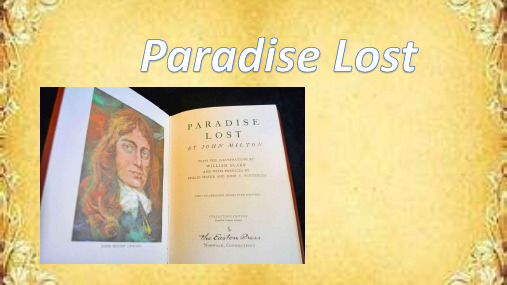
• From him, who in the happy Realms of light • 何等的变化呀!你原来住在 • Clothed with transcendent brightness didst outshine • 光明的乐土,全身披覆着、 • Myriads though bright: If he whom mutual league, • 无比的光辉,胜过群星的灿烂; • United thoughts and counsels, equal hope, • 你曾和我结成同盟,同心同气, • And hazard in the glorious enterprise, • 同一希望,在光荣的大事业中 • Joined with me once, now misery hath joined • 和我在一起。现在all; but torture without end • 希望无所不到,唯独不到那里。 • Still urges, and a fiery deluge, fed • 只有无穷无尽的苦难紧紧跟着 • With ever-burning sulphur unconsumed: • 永燃的硫磺不断的添注,不灭的火焰,洪水般向他们滚滚逼来。 • Such place Eternal Justice had prepared • 这个地方,就是正义之神为那些 • For those rebellious, here their prison ordained • 叛逆者准备的,在天外的冥荒中 • In utter darkness, and their portion set • 为他们设置的牢狱,那个地方
• One next himself in power, and next in crime, • 论权力和罪行都仅次于他的神魔, • Long after known in Palestine, and named • 后来在巴勒斯坦知道他的名字叫 • Beelzebub. To whom th' Arch-Enemy, • 别西卜。这个在天上叫做撒旦的 • And thence(之后) in Heaven called Satan, with bold words • 首要神敌,用豪言壮语打破可怕的 • Breaking the horrid silence thus began. • 沉寂,开始向他的伙伴这样说道: • “If thou beest(=be) he; But O how fallen! how changed • “是你啊;这是何等的堕落!
《失乐园》:天堂失落与人性破灭的叙事

失乐园:天堂失落与人性破灭的叙事一、引言在文学界被誉为巅峰之作的《失乐园》是英国诗人约翰·弥尔顿创作的一部史诗,被认为是西方文学中最重要的作品之一。
该作以宗教和神话为背景,讲述了亚当和夏娃在伊甸园中违抗上帝禁令而导致流放的故事。
本文将从几个方面分析《失乐园》中展现的天堂失落与人性破灭的叙事。
二、天堂的形象描写及自由意志的挑战《失乐园》中对天堂的描述令人陶醉。
弥尔顿通过细致描绘天堂中丰富多彩而和谐美丽的自然景观,体现出上帝关爱万物、造物主大能无穷。
然而,亚当和夏娃面临自由意志这一特殊挑战。
正是出于对禁忌知识的好奇心,他们冒险违抗了上帝并选择了不服从,这导致了天堂的失去和最初的完美状态被打破。
三、人性的缺陷与罪恶的原因《失乐园》从人类祖先亚当和夏娃的角度出发,展现了人性中蕴藏的各种缺陷和罪恶的原因。
在他们背离上帝命令后,他们经历了内心的懊悔、羞愧和彼此间相互指责,这引发了自卑感以及对罪恶行为产生的复杂情绪。
《失乐园》通过描绘巴力萨班等堕天使对亚当和夏娃进行诱惑、煽动他们进一步违抗上帝的情节,深刻地揭示了人性中贪欲、诱惑以及道德观念薄弱等问题。
四、赎罪与内省:对人性救赎之路的思考《失乐园》强调了每个个体应该承担自己行为后果所带来的苦痛,并通过再次建立与上帝之间的联系以寻求救赎。
故事中描绘了他们对自己罪孽深感痛苦并努力反思自己的错误行为。
亚当和夏娃最终被流放出伊甸园,但他们仍然对上帝保持着信心,并通过自省和悔过来寻求救赎之路。
五、结论《失乐园》是一部关于天堂失落和人性破灭的叙事之作。
作者通过细腻描绘下的天堂形象呈现出完美与和谐之美,而人类违抗禁忌以及其所产生的各种罪恶则展示了人性中弱点和负面情绪。
然而,故事中也展示了救赎的可能性,通过内省和对上帝的信仰以寻求救赎。
《失乐园》引发了人们对人性本质、道德观念和自由意志等重要主题的深思。
它是一部至今仍然具有启发意义与文化价值的经典之作。
失乐园爱情与艺术的纠结与追求

失乐园爱情与艺术的纠结与追求失乐园:爱情与艺术的纠结与追求长久以来,爱情和艺术一直是人们心灵深处的追求和探索。
《失乐园》(Paradise Lost)这部由英国文学大师约翰·弥尔顿所著的史诗,既是对爱情与艺术的纠结描绘,也是对这两者追求的思考和展示。
本文将探讨《失乐园》中爱情与艺术的纠结与追求,并从中汲取启发。
爱情,曾是亚当和夏娃所怀抱的最初概念。
《失乐园》中,亚当和夏娃的爱情是弥尔顿对爱情的理解和描绘。
通过他们的爱情经历,我们看到了爱情的美丽和真实。
但爱情也面临着一种追求完美的冲突,正如亚当和夏娃一样,他们被园中的禁果所诱惑,选择了违抗上帝的旨意。
这一决定不仅改变了他们自己的命运,也改变了全人类的前途。
这是爱情与责任、道德之间的冲突,也揭示了追求爱情的困境。
在这个史诗中,艺术被弥尔顿用作表达自己对人生的思考和态度。
作者化身为文学形象,以叙事的方式展示了自己的情感和思想。
他将艺术视为自己的认知和创造力的代表,通过诗歌的形式,他将自己独有的视角传递给了读者。
然而,艺术也受到了来自现实和社会的束缚。
弥尔顿在自己的创作历程中,不仅受到了政治和宗教的压力,也遭遇到了个人生活的困扰。
他的生命被纷繁复杂的世界所环绕,这种纷扰和束缚让他在艺术追求中备感纠结。
弥尔顿的《失乐园》将爱情和艺术融为一体,通过亚当和夏娃的纠结经历,描绘了人类内心追求完美和自由的愿望。
然而,他们的追求往往受到外界因素的制约,而这些因素既包括内心的困惑,也包括社会的约束。
正如亚当和夏娃在园中的抉择一样,人们在爱情和艺术的纠结中,常常需要面对选择和取舍。
面对这种困扰,我们需要学会平衡和调节,不断追求内心深处的真实与自由。
《失乐园》不仅局限于亚当和夏娃的爱情与艺术纠结,它更具有普遍的象征和意义。
人类的追求往往是矛盾的,我们在追求爱情和艺术的同时,也经历着挣扎和纠结。
爱情和艺术是我们内心最真实的表达,也是我们永恒的追求。
在这个纷繁的世界中,我们时刻面临着选择和困扰,但正是这样的纠结和冲突,让我们对爱情和艺术保持着无尽的渴望和热爱。
《失乐园》赏析

《失乐园》赏析《失乐园》是英国诗人约翰·密尔顿于1667年出版的史诗,被誉为英国文学史上的一部巨著。
本文将对《失乐园》进行深入赏析,并探讨其对人性、自由意志和上帝的理解。
一、史诗背景《失乐园》描绘了亚当、夏娃以及撒旦在上帝天堂中的起源和堕落,以及他们在堕落后面临的各种挑战和困境。
整部史诗以十二卷组成,包含众多文学样式和修辞手法,展现了密尔顿卓越的才华和丰富的知识。
二、人性的复杂性《失乐园》探索了人性复杂的本质。
亚当和夏娃在伊甸园中处于完美的和谐状态,但撒旦引诱夏娃吃了禁果后,他们堕落到了有罪和自知之间的矛盾之地。
密尔顿通过这一场景表达了人性的复杂性,人的选择和行为往往带有自相矛盾的因素。
三、自由意志的力量《失乐园》强调了自由意志的重要性。
虽然亚当和夏娃被上帝创建为自由的存在,但他们的自由意志导致了人类的堕落。
然而,密尔顿并没有将自由意志看作是一种负面的东西,相反,他认为自由意志是人类最宝贵的财富。
只有通过自由的选择,人类才能获得真正的幸福和成长。
四、上帝的慈悲与正义《失乐园》以上帝的形象出现,他既具有慈悲与怜悯的一面,又体现了正义与公正的一面。
上帝允许了亚当和夏娃的堕落,而这反映了他对人类的慈悲和尊重。
然而,上帝也存在于对人类堕落的判决和惩罚中,这展现了他的正义性。
通过描绘上帝的多重特质,密尔顿展示出了他对上帝存在的复杂理解。
五、诗歌的美学价值《失乐园》作为一部伟大的史诗,不仅内容丰富,而且在形式和技巧上也独具一格。
密尔顿运用了众多的修辞手法、押韵和对偶等文学形式,使整部作品富有韵律感和美感。
同时,史诗中的描写和对话也非常生动,给人留下深刻的印象。
密尔顿的诗笔流畅而优雅,他的语言鲜活,使读者沉浸在文学的氛围中。
综上所述,《失乐园》是一部揭示人性、探讨自由意志和反思上帝存在的重要作品。
通过对诗歌形式和众多主题的巧妙处理,密尔顿打造了一部不朽的文学杰作。
这部史诗激发了读者对人类道德和存在的思考,是英国文学史上的一颗璀璨明珠。
失乐园堕落的人性
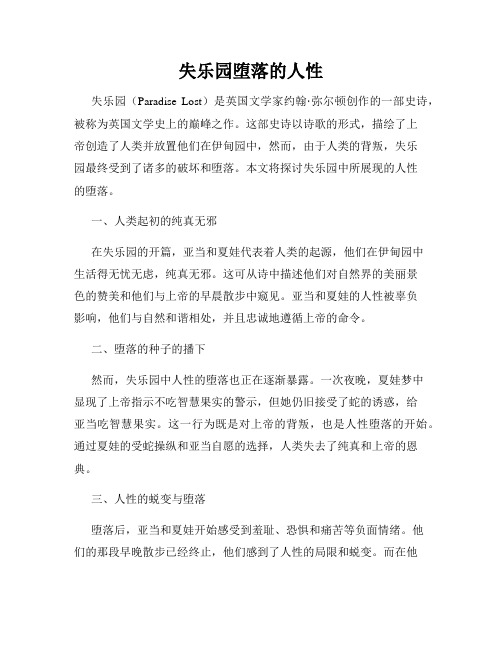
失乐园堕落的人性失乐园(Paradise Lost)是英国文学家约翰·弥尔顿创作的一部史诗,被称为英国文学史上的巅峰之作。
这部史诗以诗歌的形式,描绘了上帝创造了人类并放置他们在伊甸园中,然而,由于人类的背叛,失乐园最终受到了诸多的破坏和堕落。
本文将探讨失乐园中所展现的人性的堕落。
一、人类起初的纯真无邪在失乐园的开篇,亚当和夏娃代表着人类的起源,他们在伊甸园中生活得无忧无虑,纯真无邪。
这可从诗中描述他们对自然界的美丽景色的赞美和他们与上帝的早晨散步中窥见。
亚当和夏娃的人性被辜负影响,他们与自然和谐相处,并且忠诚地遵循上帝的命令。
二、堕落的种子的播下然而,失乐园中人性的堕落也正在逐渐暴露。
一次夜晚,夏娃梦中显现了上帝指示不吃智慧果实的警示,但她仍旧接受了蛇的诱惑,给亚当吃智慧果实。
这一行为既是对上帝的背叛,也是人性堕落的开始。
通过夏娃的受蛇操纵和亚当自愿的选择,人类失去了纯真和上帝的恩典。
三、人性的蜕变与堕落堕落后,亚当和夏娃开始感受到羞耻、恐惧和痛苦等负面情绪。
他们的那段早晚散步已经终止,他们感到了人性的局限和蜕变。
而在他们被驱逐出伊甸园之后,他们必须在外面的世界里工作和生活,饱受人类生活中的辛苦。
四、诱使堕落的势力在失乐园中,堕落的人性不仅是由人类主动选择,也受到了一些外在力量的影响。
其中,蛇作为撒旦的化身之一,是夏娃堕落的关键人物之一。
蛇以诱人的语言,诱使夏娃去吃智慧果实,从而破坏了她与上帝的纯洁的关系。
同时,撒旦的诱惑和欺骗也离不开人类的贪婪和虚荣心。
五、对堕落的思考弥尔顿通过描述夏娃与亚当的堕落,让读者对人性的堕落产生了思考。
人类的叛逆和背叛,成为了人性堕落的起因。
在诗中,弥尔顿试图探讨人性是否永远受到堕落的束缚,亚当和夏娃的错误是否能得到原谅。
六、堕落后的积极思考尽管失乐园中描述了人性的堕落,但同时也有积极的思考。
弥尔顿通过亚当和夏娃的反思和忏悔,揭示了人类在经历堕落后寻求救赎和重新获得上帝恩典的可能性。
Paradise Lost 失乐园赏析
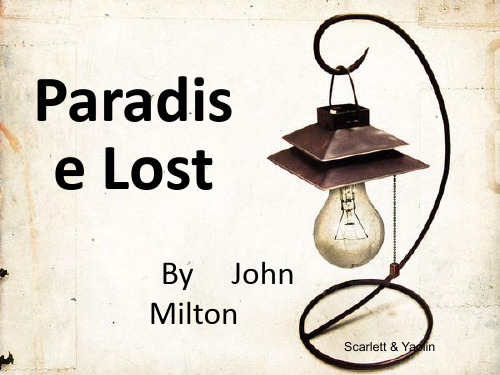
Main Characters
Satan
The God
The Son Messia
Adam and Eva Warriors
Satan
The antagonist against the Heaven A overpowering warrior A military strategist An optimist but hesitant humanized angel The positive attitude towards man
Obedient of the God
The omnipotence in military
A responsibility of human’s sins
Adam and Eva
Cherished of
everything Innocent of the world Unconquerable will to survive
The God
Holy power on the world
Arbitrariness over the world Tolerant towards the uprising Severe punishment to any crime
The Son Messia
The God’s only embodiment
Adam and Eve are presented for the first time in Christian literature as having a functional relationship while still without sin.
Satan employs his rhetorical skill to take revenge by tempting Adam and Eve.
Paradise Lost of John Milton失乐园
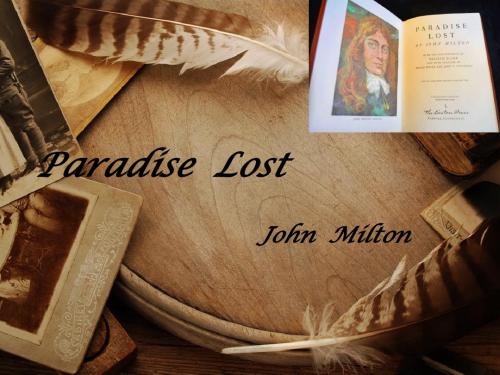
Torments him; round he throws his baleful eyes
他抬起忧虑的双眼,环视周遭,
Page 3
LOGO
p59
(9)obdurate [‘ɒbdjʊrət] :stubbornly persistent in wrongdoing 顽固的;执拗的
(9)steadfast [‘stedfɑːst; -fəst]:marked by firm determination or resolution; not shakable 坚定的; 不变的 Mixed with obdurate pride and steadfast hate: 顽固的傲气和难消的憎恨交织着。 (10) At once as far as angels ken he views 霎时间,他竭尽天使的目力,望断
Page 2
LOGO
P59
(3)vanquish [‘væŋkwɪʃ] :come out better in a competition, race, or conflict 征服;击败;克制
Lay vanquished, rolling in the fiery gulf
沉沦辗转在烈火的深渊中
LOGO
Paradise Lost
John Milton
P59
选篇出自《得乐土》第一部,被挨败的叛顺天使向撒旦乞 助,撒旦暗示本身与上帝不共戴天、要从上帝脚中攫取天 堂的决意。在这一部分里,诗人以雄伟活泼的语言,从头 刻绘了基督教《圣经》中的撒旦形象,二心气自豪,不怕 权势巨子,不惧得败,永不伏输,一曲皆具有奋发的斗争 意志,同时还具有很年夜的推翻性,这使他的叛顺精神具 有了较着的史诗性和英雄主义特点,也具有古典英雄史诗 中超人般主人公的风致。《得乐土》中的洒旦形象,一曲 被觉得是世界文教中刻绘最成功的人物形象之一。另中, 选段中描画天堂时所用的语言和意象,将这一惨烈之天栩 栩如生天托在读者少远,同时也在相当程度上增进了诗篇 道道的恢弘气质。
解读《失乐园》中的堕落与重生

解读《失乐园》中的堕落与重生
简介
《失乐园》是英国诗人约翰·密尔顿创作的史诗诗歌,被普遍认为是十七世纪最伟大的作品之一。
这部史诗以圣经创世记为基础,探讨了堕落与重生、自由意志和道德选择等主题。
堕落与重生的背景
1.上帝创造了亚当和夏娃,将他们放置在伊甸园中。
2.蛇引诱夏娃吃下禁果,导致亚当和夏娃堕落。
3.他们被逐出伊甸园,面对苦难与死亡。
堕落的影响
1.失去了天堂般的生活,在地上承受艰难和痛苦。
2.引发了人类心灵深处的罪恶欲望和邪恶行为。
重生的机会
1.主角亚当和夏娃通过接受现实并悔过自新,获得了重新获得上帝恩典和救
赎的可能性。
2.对于个人而言,理性思考和用自由意志做出正确选择可以帮助实现重生。
重生的代价
1.堕落之后,重新获得无邪纯净的状态是困难而漫长的过程。
2.必须经历痛苦、挣扎和自我反省,以纠正错误并找回心灵纯洁。
成功的重生例子
1.亚当和夏娃最终意识到他们堕落了,并寻求上帝的宽恕。
2.上帝赐予他们悔过和救赎的机会,使他们能够重获幸福与和谐。
总结
《失乐园》通过描绘亚当和夏娃的堕落与重生之旅,探讨了人类面对罪恶、选
择以及对精神归属感的渴望。
这个史诗启示我们应该直面自己内在的邪恶欲望,并通过悔过和道德选择来实现真正的重生。
《失乐园》:堕落与救赎的永恒主题
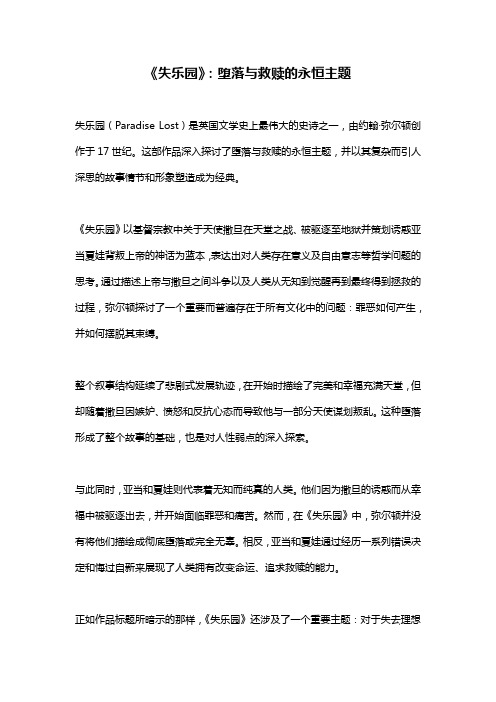
《失乐园》:堕落与救赎的永恒主题失乐园(Paradise Lost)是英国文学史上最伟大的史诗之一,由约翰·弥尔顿创作于17世纪。
这部作品深入探讨了堕落与救赎的永恒主题,并以其复杂而引人深思的故事情节和形象塑造成为经典。
《失乐园》以基督宗教中关于天使撒旦在天堂之战、被驱逐至地狱并策划诱惑亚当夏娃背叛上帝的神话为蓝本,表达出对人类存在意义及自由意志等哲学问题的思考。
通过描述上帝与撒旦之间斗争以及人类从无知到觉醒再到最终得到拯救的过程,弥尔顿探讨了一个重要而普遍存在于所有文化中的问题:罪恶如何产生,并如何摆脱其束缚。
整个叙事结构延续了悲剧式发展轨迹,在开始时描绘了完美和幸福充满天堂,但却随着撒旦因嫉妒、愤怒和反抗心态而导致他与一部分天使谋划叛乱。
这种堕落形成了整个故事的基础,也是对人性弱点的深入探索。
与此同时,亚当和夏娃则代表着无知而纯真的人类。
他们因为撒旦的诱惑而从幸福中被驱逐出去,并开始面临罪恶和痛苦。
然而,在《失乐园》中,弥尔顿并没有将他们描绘成彻底堕落或完全无辜。
相反,亚当和夏娃通过经历一系列错误决定和悔过自新来展现了人类拥有改变命运、追求救赎的能力。
正如作品标题所暗示的那样,《失乐园》还涉及了一个重要主题:对于失去理想状态(即天堂)后寻找重新获得快乐与满足感之路。
撒旦在地狱感到孤独、愤怒和沮丧,并试图通过引诱亚当背叛上帝来实现复仇,但最终却只收获到毁灭和更大的痛苦。
相比之下,亚当选择接受上帝给予的原谅与救赎,最终找回了失去的快乐与幸福。
在《失乐园》中,弥尔顿通过描绘一系列角色和事件,以及对人性、命运和道德的思考来探讨堕落与救赎的主题。
作品展现了撒旦从天使到堕落恶魔的转变过程,亚当和夏娃由无知而觉醒并寻求拯救的历程。
这些形象塑造不仅为读者提供了一个深思熟虑的叙事框架,同时也带给我们关于内心挣扎、选择与奋斗等永恒问题上的启示。
总之,《失乐园》是一部充满哲理和复杂情节的文学巨著,在其构建出来的世界中呈现了关于堕落与救赎这一永恒主题,并引发读者对人类自由意志、罪孽原因及如何摆脱罪恶束缚等问题进行反思。
《失乐园》:天堂与地狱的永恒话题

失乐园:天堂与地狱的永恒话题
概述
《失乐园》是英国文学巨匠约翰·弥尔顿于1667年创作的一部史诗诗剧。
这部作品以《圣经》中的创世纪故事为基础,探讨了天堂与地狱、人类自由意志与神权统治等深刻而永恒的主题。
本文将从不同角度分析这些主题在《失乐园》中的描绘和探索。
天堂与地狱:善恶对立之战
《失乐园》通过描述天使路西法叛逆、被赶出天堂的事件,展现了天堂和地狱两个截然相反的存在,并呈现了永恒之间善恶对立之战。
作者通过描绘华丽而令人震撼的景观,将读者带入到人类灵魂所涉及的永远性决斗之中。
人类自由意志与罪恶
在《失乐园》中,弥尔顿描绘了亚当和夏娃曾生活在无忧无虑、无罪无过错的乐园里,但他们违反了上帝的禁忌而失去了这种纯洁的状态。
作品中通过亚当和夏娃的选择和行动,探讨了人类自由意志与罪恶之间的关系以及后果。
上帝权力与人类命运
《失乐园》反映了上帝对人类未来命运的决定权力和控制,并揭示了人类对于命运和永恒之间无法逃脱的矛盾。
作品中上帝是全知全能的存在,但同时充满着仁慈与严苛。
作者通过多个角色的言行,表达了对神奇力量和合理性之间不断追问、沉思、深奥探索。
结论
《失乐园》是一部具有深邃内涵和智慧的文学之作,它以天堂与地狱、自由意志与罪恶、上帝权力与命运等永恒话题为蓝本,呈现了作者对这些主题的独特理解。
通过这部作品,读者得以思考生命意义、道德问题以及人性本质等重要议题。
《失乐园》将继续留下让读者探索和讨论的余地,成为文学史上不可忽视的经典之作。
Paradise__Lost(失乐园中撒旦形象的分析)
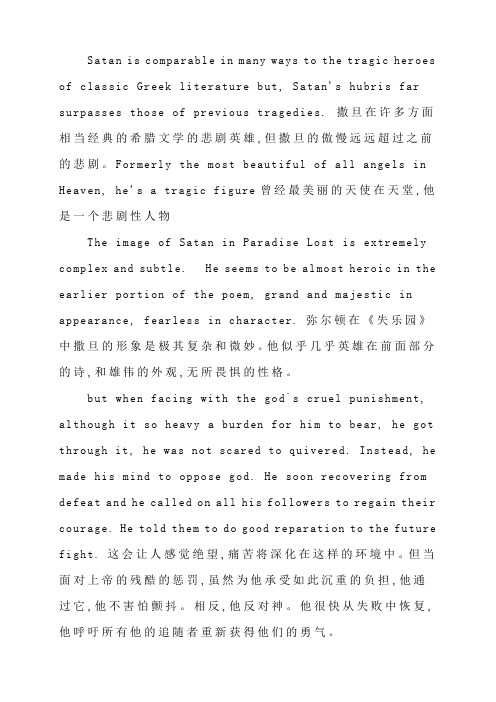
Satan is comparable in many ways to the tragic heroes of classic Greek literature but, Satan's hubris far surpasses those of previous tragedies. 撒旦在许多方面相当经典的希腊文学的悲剧英雄,但撒旦的傲慢远远超过之前的悲剧。
Formerly the most beautiful of all angels in Heaven, he's a tragic figure曾经最美丽的天使在天堂,他是一个悲剧性人物The image of Satan in Paradise Lost is extremely complex and subtle. He seems to be almost heroic in the earlier portion of the poem, grand and majestic in appearance, fearless in character. 弥尔顿在《失乐园》中撒旦的形象是极其复杂和微妙。
他似乎几乎英雄在前面部分的诗,和雄伟的外观,无所畏惧的性格。
but when facing with the god`s cruel punishment, although it so heavy a burden for him to bear, he got through it, he was not scared to quivered. Instead, he made his mind to oppose god. He soon recovering from defeat and he called on all his followers to regain their courage. He told them to do good reparation to the future fight. 这会让人感觉绝望,痛苦将深化在这样的环境中。
paradiselost失乐园赏析课件

paradiselost失乐园赏析课件paradise-lost失乐园赏析课件————————————————————————————————作者:————————————————————————————————日期:Paradise LostType of WorkParadise Lost is an epic poem which —like the epic poems of Homer, Dante, Vergil, and Goethe—tells a story about momentous events while incorporating grand themes that are timeless and universal.Date CompletedMilton completed the first version of Paradise Lost in 1667. It consisted of 10 books. In 1668 and 1669, he added an introductory comment about the verse form and a special section with summaries of each book. In 1674, he published the final version of the epic, in which he divided Books 7 and 10 into two books each. The completed work thus had 12 books instead of 10. He also placed each summary at the beginning of the book it summarized.SourcesMilton used the Bible, Homer's Iliad andOdyssey, Vergil's Aeneid, and the stories in Greco-Roman mythology as sources of information and as writing models. The Bible's Book of Genesis is the main source for his retelling of the story of creation and the first humans, Adam and Eve.SettingsThe settings are heaven, hell, the firmament (苍穹) (Chaos), and earth.CharactersGod the Father, God the Son: (trinity)Two of the three divine persons making up the all-powerful Godhead, the single deity (神性)that created and ruled all that exists outside of itself. The third divine person, the Holy Spirit, does not play a role in Paradise Lost. God the Father is portrayed as just but merciful, condemning (批判) the defiant (目中无人)and unrepentant (不后悔的) rebel angels but permitting redemption of the repentant Adam and Eve. God the Son volunteers to redeem them by becoming human and enduring suffering and death.Satan (Lucifer, Archfiend): Powerful and prideful angel who, with legions (众多的) of supporters, leads an unsuccessful rebellion against God and suffers eternal damnation. To gain revenge, he devises a plan to corrupt God's newly created beings, Adam and Eve, through deceit. Modern readers often admire him for his steely defiance (藐视). He would rather rule in hell, he says, than serve in heaven. It was not Milton's intent, however, to create an admirable character; rather his intent was to create a character of colossal (巨大的) hatred —loathsome (令人讨厌的), execrable (恶劣的), incurably remorseless (冷酷无情的).Adam and Eve: The first human beings, created by God to fill the void(真空)that resulted when God cast Satan and his supporters out of the celestial realm. Adam and Eve live on the planet earth in utter happiness in a special garden where spring is the only season and love and godly living prevail. Though they have all that theywant and need, cunning Satan tells them they can have knowledge and status beyond their reach if only they eat of the fruit of the Tree of Knowledge. Eve can become a goddess, he says. Vanity overtakes her. She eats. Adam reluctantly does thesame.Gabriel, Raphael, Michael, Uriel: Powerful and fearless angels on the side of God. Beelzebub, Mammon, Belial, Moloch: Powerful leaders in Satan's army. In a great council in hell, each of them speaks his mind on what policy devil-kind should follow after losing paradise. Should they make a new war? Should they make peace?Ithuriel, Zephron: Angels who expel Satan from the Garden of Eden with the help of a sign from God. Satan returns to the garden later to complete his devious enterprise.Mulciber: Fallen angel who designs hell's capital city and seat of government, Pandemonium. In ancient Roman mythology, Mulciber is another name for Vulcan (Greek: Hephaestus), god of fire and the forge. As ablacksmith, he kept shop in burning mountains (volcanoes).Sin: Daughter of Satan. She was born from his head in the manner of Athena, Greek goddess of wisdom and war, who sprang from the forehead of Zeus, king of the gods.Death: Son of Satan and SinVarious Other Angels and DevilsMilton's Solar SystemIn describing the planets and other celestial bodies, Milton models God’s creatio n on the Ptolemaic天动说的design (also called the geocentric design) rather than the Copernican design (also called the heliocentric 以太阳为中心的design). The former placed earth at the center of the solar system, with the sun and other celestial bodies orbiting it. Copernicus and other scientists later proved that the earth orbits the sun. Milton was aware of the Copernican theory, but he used the Ptolemaic design—either because he believed it was the more credible theory or becausehe believed it would better serve hisliterary purpose. In Paradise Lost, Adam inquires about the movements of celestial bodies—in particular, whether earth orbits the sun or vice versa—in his conversation with the archangel天使Raphael, but Raphael gives no definite answer. Raphael may have been speaking for Milton. Style and Verse FormatMilton wrote Paradise Lost in dignified, lofty, melodic English free of any colloquialisms and slangs that would have limited the work's timeliness and universality. The format, Milton says in an introductory note, is "English heroic verse without rhyme"—in other words, blank verse, the same verse form used by Shakespeare in his plays. Milton's strong religious faith infuses the poem with sincerity and moral purpose, but he does not allow his enthusiasm for his subject to overtake control of his writing. Though Milton frequently uses obscure allusions to mythology and history, as well as occasional difficult words and phrases, his language is never deliberately affected or ostentatious炫耀的. What is more, itdoes not preach and does not take the reader on circumlocutory迂回的expeditions. Like a symphony composer—mighty Beethoven, for example —Milton is always in control, tempering his creative genius with his technical discipline. With a good dictionary and an annotated有注解的text, a first-time reader of Milton can easily follow and understand the story while developing an appreciation for the exquisite writing.Epic ConventionsIn Paradise Lost, Milton used the classical epic conventions—literary practices, rules, or devices established by Homer that became commonplace in epic poetry. Some of these practiceswere also used in other genres of literature. Among the classical conventions Milton used are the following:(1) The invocation 祈祷of the muse, in which a writer requests divine help in composing his work.(2) Telling a story with which readers or listeners are already familiar; they know thecharacters, the plot, and the outcome. Most of the great writers of the ancient world—as well as many great writers in later times, including Shakespeare—frequently told stories already known to the public. Thus, in such stories, there were no unexpected plot twists, no surprise endings. If this sounds strange to you, the modern reader and theatergoer, consider that many of the most popular motion pictures today are about stories already known to the public. Examples are The Passion of the Christ, Titanic, The Ten Commandments, Troy, Spartacus, Pearl Harbor, and Gettysburg.(3) Beginning the story in the middle, a literary convention known by its Latin term in media res 资源(in the middle of things). Such a convention allows a writer to begin his story at an exciting part, then flash back to fill the reader in on details leading up to that exciting part.(4) Announcing or introducing a list of characters who play a major role in the story. They may speak at some length about how to resolve a problem (as the followers of Satan do early in Paradise Lost).(5) Conflict in the celestial realm. Divine beings fight and scheme against one another in the epics of Homer and Vergil, and they do so in Paradise Lost on a grand scale, with Satan and his forces opposing God and his forces.(6) Use of dramatic irony. Dramatic irony is a literary devicein which a character in a story fails to see or understand what is obvious to the audience or readers. Dramatic irony appears frequently in the plays of the ancient Greeks. For example, in Oedipux Rex, by Sophocles, dramatic irony occurs when Oedipus fails to realize what the audience knows—that he married his own mother. In Paradise Lost, dramatic irony occurs when Adam and Eve happily go about daily life in the Garden of Eden unaware that they will succumb to the devil's temptation and suffer the loss of Paradise. Dramatic irony also occurs when Satan and his followers fail to understand that it is impossible ultimately to thwart挫败or circumvent divine will and justice.Plot SummaryAll Hell broke looseBook IV, Paradise Lost.The Invocation of the Muse/doc/4f3501395.html,ton opens Paradise Lost by asking a muse to inspire his writing. In ancient Greece and Rome, poets had always requested “the muse” to fire them with creative genius when they began long narrative poems, called epics, about godlike heroes and villains. In Greek mythology, there were nine muses, all sisters, who were believed to inspire poets, historians, flutists, dancers, singers, astronomers, philosophers, and other thinkers and artists. If one wanted to write a great poem, play a musical instrument with bravado, or develop a grand scientific or philosophical theory, he would ask for help from a muse.When a writer asked for help, he was said to be “invoking the muse.” The muse of epic poetry was named Calliope [kuh LY uh pe]. However, in Book 7, Milton identifies Urania—the museofastronomy—as the goddess to whom he addresses his plea for inspiration.In Milton’s time, writers no longer believed in muses, of course. Nevertheless, since they symbolized inspiration, writers continued to invoke them. So it was that when Milton began Paradise Lost, he addressed the muse in the telling of his tale, writing, “I thence invoke thy aid to my adventurous Song.”The StorySatan and his followers rebel against God. But God and his mighty angels defeat the rebels in a terrible war. God casts them into a dark abyss with a lake of fire. There, the defeated legions deplore悲叹their fate and consider their future. In a great council, the many thousands of the fallen assemble in the capital city and seat of government, Pandemonium, where Satan sits on his royal throne, to hear their leaders speak their minds on the course of action they should take. Moloc, a rebel leader who fought fiercely against the forces of the Almighty, calls forrenewed war. Belial彼勒advises a do-nothing policy, maintaining that the horror of their hell will abate in time and that their surroundings will brighten. To challenge God would only result in another defeat and more punishment. After Mammon advises peace, Beelzebub—a majestic, imposing figure—notes that God is creating a new creature, man, who will occupy a new world, earth. If they turn this new creature from his ordained course, using force or trickery, they can enjoy revenge against God, Beelzebub says. His plan is not his own; it is the plan of Satan, his master. The assembly of devils does not respond; they do not know what to say about this proposal. Then the leader of all the accursed, Satan, speaks up. He first bemoans悲叹their environs: Our prison strong, this huge convex of Fire, Outrageous to devour, immures us round Ninefold, and gates of burning AdamantBarred over us prohibit all egress.(Book 2, lines 444-447)But if any of them manages to break free, Satan says, he will encounter a dark void beyond whichare unknown regions and unknown dangers. Nevertheless, Satan, as leader, says he will venture forth and "Through all the coasts of dark destruction seek / Deliverance for us all: this enterprise / None shall partake参与with me." His "enterprise," of course is to work his deceptive charms against the new creatures. He will subvert 破坏God’s plan and give hell a reason to cheer. None in the assemblage spoke against this plan. Instead, all rose with a thunderous noise to give assent:Towards him they bendWith awful reverence prone; and as a GodExtol him equal to the highest in Heaven. (Book 2, 477-479) And so the assembly broke up and ventured off into the regions from whence they came: Rocks, caves, lakes, fens, bogs, dens, and shades of death,A universe of death, which God by curse Created evil, for evil only good,Where all life dies, death lives, and nature breeds, Perverse, all monstrous, all prodigious things,Abominable, inutterable, and worse.(Book 2, 621-626)Meanwhile, Satan "with thoughts inflamed of highest design / Puts on swift wings, and toward the Gates of Hell / Explores his solitary flight. . . " (Book 2, lines 630-632). Later, Satan's daughter,Sin, who was born from the archfiend's head, and his son, Death, who was born of Satan's union with Sin, decide to follow and assist their father. In heaven, God the Father and God the Son observe Satan flying in a rage toward earth. Satan will corrupt his new creatures, the Father says, even though they possess the willpower to reject sin. Their penalty will be death. However, because they will not rebel against God but instead succumb to Satan’s temptation, they will be redeemable—if someone takes on the burden of their sin by suffering and dying on their behalf. When the Son offers himself for this task, the Father accepts the offer and approves of his incarnation in the world of man.To reach earth, Satan must fly past Uriel, a member of the highest-ranking order of angels,the Seraphim. Uriel watches over earth from his post at the sun. Disguising himself as one of the cherubim—the second-highest-ranking order of angels—Satan asks Uriel to point out the planet where man dwells so that he may go there, admire this new creature, and praise his great Maker. Uriel instructs him, and Satan resumes his journey and arrives at earth.The sight of Paradise disheartens him, for it reminds him of all that he lost in his rebellion against God. After struggling with self-recrimination and doubt, Satan regains himself and enters Paradise, taking the shape of a cormorant—a web-footed sea bird—and perching in the Tree of Life (a tree producing fruit which, when eaten, yields everlasting life) to observe the newly created Adam and Eve. They are beautiful, happy creatures who surprise Satan with their ability to speak and think logically.Later, when they are asleep, Satan whispers evil thoughts into Eve’s ear—of “vain hopes” and “inordinate desires.” When the archangel Gabriel learns of Satan’s presence in Eden, hesends twoangels to expel him. When they confront him, Satan defiantly scorns them and prepares for a fight. An angelic squadron descends toward Eden under the command of Gabriel, and a sign appears in the heavens in which God weighs the adversaries in his golden scales. When Gabriel tells Satan to look at the scales, the archfiend sees that they tip in the favor of the celestial forces, and he flees.On a mission from God, the angel Raphael warns Adam and Eve about Satan. So that they understand the nature of their foe, Raphael tells them the story of Satan’s rebellion and the great war in which angels on both sides fought fiercely. It ended in Satan’s expulsion from heaven, Raphael says, after the Son of God intervened on behalf of the celestial forces. A new world with new creatures was then created to fill the void left by the rebels cast into the deep.Adam, a curious creature, asks Raphael about the earth and its place in creation. Raphael explains the universe but warns Adam to temper his desire for knowledge with humility. When Adam expresses his great satisfaction with Eve as a mate, Raphael again cautions him to be careful. Living with and loving a creature such as Eve, with all of her charm and beauty, is wonderful; however, Adam must not let her divert his attention from his responsibilities to God.Satan returns to the Garden of Eden in the form of a snake and tempts Eve to eat fruit of the Tree of Knowledge in defiance of a divine command never to do so. If she and Adam taste the fruit, he says, they will become gods. Eve eats. After Satan leaves, Adam—though reluctant—also eats. And so Adam and Eve fall from grace, and the Son of God pronounces judgment on thetransgressing humans.When Satan returns in triumph to hell, the multitude of fiends cheer him but suddenly turn into serpents. Earth becomes a place of changing seasons; the eternal spring is no more. Adam is downcast, wishing for death, and blames Eve for leading them astray. But they reconcile and decide to go on, confessing their wrongdoing and pleading for forgiveness.。
paradise lost赏析

《失乐园》是英国政治家、学者约翰·弥尔顿创作的史诗,以宏大的叙述、深刻的哲学思想、丰富的幻想元素、复杂的情节以及优美的音韵和音乐式语调,展现了人类历史和宇宙观念的壮丽画卷。
在《失乐园》中,弥尔顿以撒旦的反抗和最终失败的情节为主线,将人类的堕落与救赎、自由意志与罪恶等主题紧密相连,深刻探讨了人类命运的复杂性和宇宙间正反相对、相互矛盾的两种势力的存在。
作品中的主要人物形象鲜明,包括上帝、撒旦、亚当和夏娃等,他们各自代表着不同的哲学观念和宗教信仰。
在神话符号的角度上,《失乐园》展示了一个充满神秘和象征意义的世界。
例如,作品中的许多符号和象征,如知识树、蛇、天使等,都具有深刻的哲学意义和启示作用。
这些符号和象征使得作品更加深邃、富有哲学意义。
在宗教哲学角度上,《失乐园》主要主题是失乐园,它是对长久以来关于上帝、人类、自由意志和罪恶的辩论的哲学回应。
作品展示了人类失去天堂的悲剧,同时也揭示了人类命运的复杂性和宇宙间正反相对、相互矛盾的两种势力的存在。
总的来说,《失乐园》是一部具有深刻哲学意义和启示作用的史诗。
通过对人类历史和宇宙观念的描述,作品展现了人类命运的复杂性和宇宙间正反相对、相互矛盾的两种势力的存在。
同时,作品也启示人们要珍惜自由意志和知识,追求真理和正义,以实现人类的救赎和自我超越。
《失乐园》:人类堕落与复仇的象征
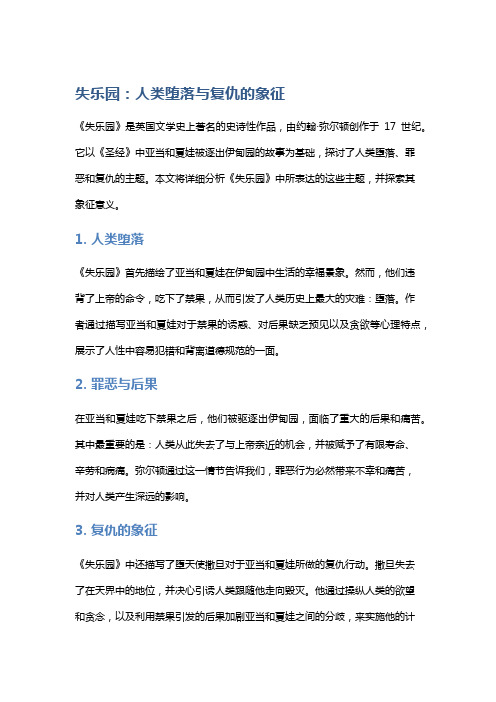
失乐园:人类堕落与复仇的象征《失乐园》是英国文学史上著名的史诗性作品,由约翰·弥尔顿创作于17世纪。
它以《圣经》中亚当和夏娃被逐出伊甸园的故事为基础,探讨了人类堕落、罪恶和复仇的主题。
本文将详细分析《失乐园》中所表达的这些主题,并探索其象征意义。
1. 人类堕落《失乐园》首先描绘了亚当和夏娃在伊甸园中生活的幸福景象。
然而,他们违背了上帝的命令,吃下了禁果,从而引发了人类历史上最大的灾难:堕落。
作者通过描写亚当和夏娃对于禁果的诱惑、对后果缺乏预见以及贪欲等心理特点,展示了人性中容易犯错和背离道德规范的一面。
2. 罪恶与后果在亚当和夏娃吃下禁果之后,他们被驱逐出伊甸园,面临了重大的后果和痛苦。
其中最重要的是:人类从此失去了与上帝亲近的机会,并被赋予了有限寿命、辛劳和病痛。
弥尔顿通过这一情节告诉我们,罪恶行为必然带来不幸和痛苦,并对人类产生深远的影响。
3. 复仇的象征《失乐园》中还描写了堕天使撒旦对于亚当和夏娃所做的复仇行动。
撒旦失去了在天界中的地位,并决心引诱人类跟随他走向毁灭。
他通过操纵人类的欲望和贪念,以及利用禁果引发的后果加剧亚当和夏娃之间的分歧,来实施他的计划。
撒旦的复仇意味着对人类背叛和罪恶行为进行惩罚,同时也象征着人类无法摆脱罪恶带来的后果。
4. 弥尔顿对于堕落和复仇主题的思考通过《失乐园》,弥尔顿探讨了人性中存在的自由意志、诱惑和堕落的问题。
他认为人类在选择时要承担后果,并表示对于复仇行为的警示。
同时,弥尔顿还表达了对于罪恶与痛苦的理解,以及对人类追求幸福和救赎的希望。
综上所述,《失乐园》通过描绘亚当和夏娃的堕落、罪恶与复仇的故事,深入探讨了人类的困境和错误选择所带来的后果。
它不仅是一部伟大的文学作品,更是对于人性和道德问题进行思考与反思的重要作品。
失乐园
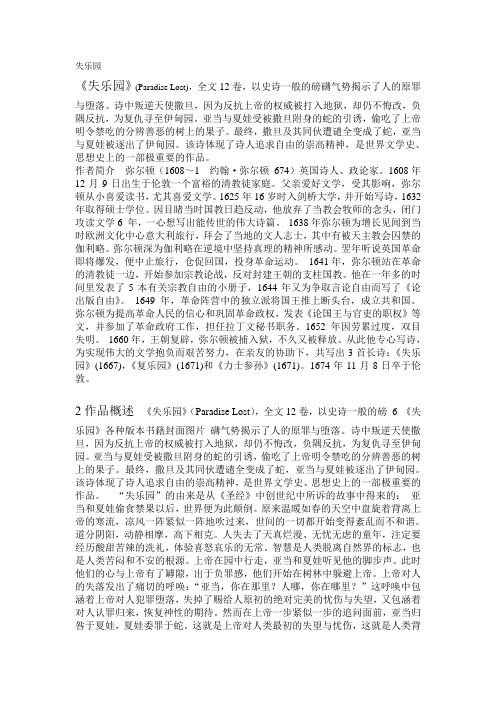
失乐园《失乐园》(Paradise Lost),全文12卷,以史诗一般的磅礴气势揭示了人的原罪与堕落。
诗中叛逆天使撒旦,因为反抗上帝的权威被打入地狱,却仍不悔改,负隅反抗,为复仇寻至伊甸园。
亚当与夏娃受被撒旦附身的蛇的引诱,偷吃了上帝明令禁吃的分辨善恶的树上的果子。
最终,撒旦及其同伙遭谴全变成了蛇,亚当与夏娃被逐出了伊甸园。
该诗体现了诗人追求自由的崇高精神,是世界文学史、思想史上的一部极重要的作品。
作者简介弥尔顿(1608~1 约翰·弥尔顿674)英国诗人、政论家。
1608年12月9日出生于伦敦一个富裕的清教徒家庭。
父亲爱好文学,受其影响,弥尔顿从小喜爱读书,尤其喜爱文学。
1625年16岁时入剑桥大学,并开始写诗,1632年取得硕士学位。
因目睹当时国教日趋反动,他放弃了当教会牧师的念头,闭门攻读文学6 年,一心想写出能传世的伟大诗篇。
1638年弥尔顿为增长见闻到当时欧洲文化中心意大利旅行,拜会了当地的文人志士,其中有被天主教会囚禁的伽利略。
弥尔顿深为伽利略在逆境中坚持真理的精神所感动。
翌年听说英国革命即将爆发,便中止旅行,仓促回国,投身革命运动。
1641年,弥尔顿站在革命的清教徒一边,开始参加宗教论战,反对封建王朝的支柱国教。
他在一年多的时间里发表了5本有关宗教自由的小册子,1644年又为争取言论自由而写了《论出版自由》。
1649年,革命阵营中的独立派将国王推上断头台,成立共和国。
弥尔顿为提高革命人民的信心和巩固革命政权,发表《论国王与官吏的职权》等文,并参加了革命政府工作,担任拉丁文秘书职务。
1652年因劳累过度,双目失明。
1660年,王朝复辟,弥尔顿被捕入狱,不久又被释放。
从此他专心写诗,为实现伟大的文学抱负而艰苦努力,在亲友的协助下,共写出3首长诗:《失乐园》(1667),《复乐园》(1671)和《力士参孙》(1671)。
1674年11月8日卒于伦敦。
2作品概述《失乐园》(Paradise Lost),全文12卷,以史诗一般的磅6 《失乐园》各种版本书籍封面图片礴气势揭示了人的原罪与堕落。
- 1、下载文档前请自行甄别文档内容的完整性,平台不提供额外的编辑、内容补充、找答案等附加服务。
- 2、"仅部分预览"的文档,不可在线预览部分如存在完整性等问题,可反馈申请退款(可完整预览的文档不适用该条件!)。
- 3、如文档侵犯您的权益,请联系客服反馈,我们会尽快为您处理(人工客服工作时间:9:00-18:30)。
William Blake (English, 1757–1827),
'Satan Watching the Caresses of Adam and Eve'
Satan successfully tempts Eve by preying on her vanity and tricking her with rhetoric, and Adam, seeing Eve has sinned, knowingly commits the sห้องสมุดไป่ตู้me sin. He declares to Eve that since she was made from his flesh, they are bound to one another so that if she dies, he must also die.
Puritanism
Puritanism & Christianity
(16-17)Humanism in Renaissance and the Reformation(宗教改革) produced the Puritainism. No Pope in the parliament.
Bible is the only cannon.
Paradi se Lost
By John Milton
Scarlett & Yaolin
John Milton
Brief Introduction of the story Characters The Pomes The Poems in Reality
Puritanism
The God
Holy power on the world
Arbitrariness over the world Tolerant towards the uprising Severe punishment to any crime
The Son Messia
The God’s only embodiment
Obedient of the God
The omnipotence in military
A responsibility of human’s sins
Adam and Eva
Cherished of
everything Innocent of the world Unconquerable will to survive
Title page of the first edition (1668)
Story
The story contains two arcs: one of Satan and the another of Adam and Eve.
Satan’s Rebellion
“all was not lost”
Be diligent and lead a simple life.
The End Thank You
John Milton
• Born 9 December 1608 Bread Street, Cheapside, London, England • Died 8 November 1674 (aged 65) Bunhill, London, England • Occupation Poet, Author, Polemicist, Civil Servant for the Commonwealth of England • Notable Works Paradise Lost, Paradise Regained, Samson Agonistes
The Poems
• He first used blank verse in nondramatic • Abstract from three unities Time, Place and Action.
The Poems In Reality
In the battle, the uprisings show us a new weapon with a long tube and hollow inside ,which is now called Canon 。 The angels watch the human’s world clearly by use of a kind of Galileo’s big invention- Telescope. The battlefield-the burning-lake.
Other Warriors
Satan’s troops The Holy Troops (七大天使长) 鬼王Moloch 乌利尔Uriel 天体星辰 鬼王Beelzebub 拉斐尔Raphael人类灵魂 贪婪鬼王Mammon 米迦勒Mikael守护神 比列Belial 莎莉叶Sariel灵魂复仇者 撒拉弗Seraph 加百列Gabriel天堂掌管 雷米勒Remiel冥界灵魂
Adam and Eve are presented for the first time in Christian literature as having a functional relationship while still without sin.
Satan employs his rhetorical skill to take revenge by tempting Adam and Eve.
Main Characters
Satan
The God
The Son Messia
Adam and Eva Warriors
Satan
The antagonist against the Heaven A overpowering warrior A military strategist An optimist but hesitant humanized angel The positive attitude towards man
William Blake ‘The Temptation and Fall of Eve’
They feel sorry for what they have done and prayed to God.
For their disobedience, Adam and Eve were driven out of Paradise. In the last book, they were given the hope for redemption. The poem ended with Adam and Eve walking away from Paradise, hand in hand, and the gates of Eden were closed behind them.
Paradise Lost
Paradise Lost is an epic poem in blank verse divided into 12 books. The original story is taken from Genesis 3: 1-24 of the Bible(《圣经》中的《创世纪3: 1-24》). The poem concerns the Christian story of the Fall of Man: the temptation of Adam and Eve by the fallen angel Satan and their expulsion from the garden of Eden.
